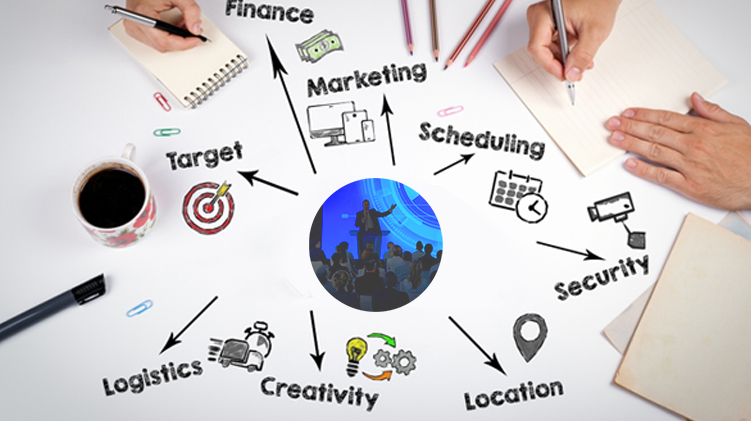

Event Management Process: Step-by-Step Guide
In the realm of event planning, the stakes are high and the pressure is on. Whether it's demonstrating ROI, impressing stakeholders, or captivating sponsors, event planners are tasked with delivering results within a fixed timeline.Managing large-scale, performance-driven events can feel like embarking on a challenging journey. With myriad details to coordinate and deadlines to meet, maintaining organization and momentum is essential.
This article aims to offer a strategic overview of the event management process, providing valuable insights from a bird's-eye view. We've structured this high-level framework into five key stages, providing a roadmap to guide you through the intricacies of planning and executing successful events.
Event Management Tips
Here are some essential tips to guide you through the event management maze:
- Define Objectives: Before getting into the details, decide what you want your event to achieve. Whether it's getting more leads, building relationships, or raising money, having clear goals will guide your planning.
- Create a Budget: Money matters. Make a realistic budget that covers everything from booking a venue to promoting your event. Spend your money wisely to avoid financial problems later.
- Select a Suitable Venue: The venue can make or break your event. Think about things like how many people it can hold, where it's located, and what facilities it has. Sort out the details and sign contracts early to avoid last-minute stress.
- Craft a Compelling Event Concept: Capture people's interest with a fun and unique event idea. Whether it's a themed party or a useful workshop, make sure it's something your target audience will love.
- Harness Technology: Make things easier by using event management software. It can handle tasks like registration and ticketing, and make the event smoother for everyone involved.
- Sharing Responsibilities: You can't do everything yourself. Get a team together and give each person a specific job. This way, everyone knows what they're doing, and no one gets overwhelmed.
- Execute a Robust Marketing Strategy: Spread the word far and wide with a good marketing plan. Use social media, emails, and partnerships to drum up excitement and get more people to attend.
Core Features of an Event Plan
A meticulously crafted event plan serves as a roadmap, guiding you through every stage of the event management process. Here are the core features that constitute an effective event plan:
- Timeline: A detailed timeline delineating pre-event, on-site, and post-event activities ensures seamless execution. Set deadlines for tasks, allowing ample time for contingencies.
- Logistics Management: From transportation to audio-visual equipment, logistics management is crucial for event success. Create a comprehensive inventory list and coordinate logistics with vendors to avoid logistical hiccups.
- Risk Assessment: Anticipate and mitigate potential risks that may arise during the event. Conduct thorough risk assessments, outlining contingency plans for emergencies such as inclement weather or technical glitches.
- Budget Allocation: Monitor and track expenses throughout the event lifecycle. Allocate funds wisely, prioritizing high-impact elements while adhering to budget constraints.
- Marketing Strategy: Develop a multi-channel marketing strategy to promote your event and attract attendees. Utilize digital platforms, traditional media, and networking opportunities to maximize reach.
- Attendee Engagement: Foster meaningful interactions and engagement opportunities for attendees. Incorporate interactive elements such as workshops, networking sessions, and Q&A panels to enhance the attendee experience.
- Post-Event Evaluation: Conduct a comprehensive post-event evaluation to assess the success of your event. Solicit feedback from attendees, sponsors, and stakeholders to identify areas for improvement and inform future events.
Innovative Marketing Ideas for Events: Maximizing Impact and Engagement
Effective marketing is crucial for the success of any event. To ensure maximum attendance and engagement, event organizers must think creatively and strategically when promoting their events. Here are some innovative marketing ideas to help you generate buzz and excitement around your next event:
- Social Media Campaigns: Leverage the power of social media platforms such as Facebook, Instagram, Twitter, and LinkedIn to promote your event. Create engaging posts, share behind-the-scenes content, and run targeted ads to reach your target audience.
- Influencer Partnerships: Collaborate with influencers and industry experts to increase visibility and credibility for your event. Identify influencers with a relevant following and engage them to promote your event through sponsored posts, live streams, or guest appearances..
- Interactive Contests and Giveaways: Organize online contests or giveaways to generate excitement and incentivize attendance. Offer free tickets, exclusive merchandise, or VIP experiences as prizes and encourage participants to share the event with their networks.
- Email Marketing Campaigns: Build an email list of potential attendees and send out targeted email campaigns to promote your event. Personalize your messaging, highlight key benefits, and include compelling visuals to capture recipients' attention and drive registrations.
- Content Marketing: Create compelling content related to your event, such as blog posts, articles, videos, or podcasts. Share valuable insights, industry trends, or sneak peeks of what attendees can expect, positioning your event as a must-attend for your target audience.
- Collaborative Partnerships: Partner with complementary businesses, organizations, or sponsors to expand your event's reach and tap into their existing networks. Cross-promote each other's brands, co-host pre-event meetups, or offer joint discounts to attract more attendees.
- Virtual Events and Webinars: In today's digital age, virtual events and webinars offer a convenient and cost-effective way to engage audiences globally. Host virtual networking sessions, panel discussions, or workshops to provide valuable content and drive registrations.
- Live Streaming and Video Content: Utilize live streaming platforms like Facebook Live, Instagram Live, or YouTube to broadcast live coverage of your event. Share behind-the-scenes footage, interviews with speakers or performers, and real-time updates to engage remote audiences and generate excitement.
- Local Community Engagement: Tap into your local community by hosting pre-event meetups, workshops, or networking events. Partner with local businesses, media outlets, or influencers to reach a broader audience and build anticipation for your event.
- Referral Programs: Encourage word-of-mouth marketing by offering incentives or discounts to attendees who refer their friends or colleagues to the event. Implement a referral program with unique referral links or codes to track and reward successful referrals.
By incorporating these innovative marketing ideas into your event promotion strategy, you can effectively reach and engage your target audience, drive registrations, and create a buzz that ensures a successful and memorable event experience.
Conclusion
In conclusion, mastering the event management process is essential for hosting successful events that leave a lasting impression. From meticulous planning to seamless execution, every stage of the event lifecycle requires careful attention and strategic foresight. By embracing best practices, leveraging technology, and prioritizing attendee experience, businesses can unlock the full potential of their events as powerful marketing and networking tools
For expert guidance and support in your event management endeavors, consider partnering with Rishiraj Media. With a wealth of experience and a proven track record of success, Rishiraj Media offers comprehensive event management solutions tailored to your unique needs and objectives.